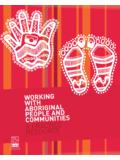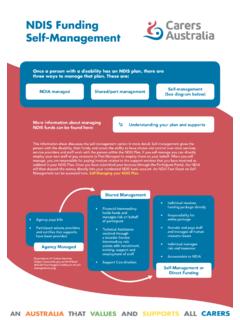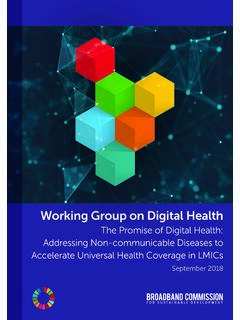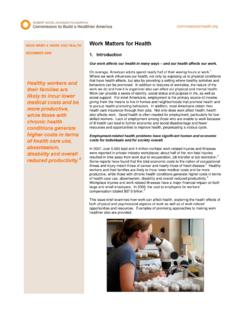Transcription of Mental Health Carer Checklist - Carers Australia
1 Health Carer ChecklistPurpose of this checklistThis Checklist is designed to assist Carers to describe the support they provide to contribute to the National Disability Insurance Scheme (NDIS*) planning process for someone with a psychosocial disability. It is not a compulsory part of the NDIS planning process and you do not have to complete it. It may be of use to you in the preparing for your participation in planning sessions or in talking to the NDIS about your should be read in conjunction with Guide for Mental Health Carers on the NDIS developed by Carers Australia and Mental Health Australia . The guide provides information about your role as the Carer in the NDIS and what supports are available for Carers through the NDIS. *Words and acronyms in bold are explained at the end of this document. Background Under the NDIS people with disability will be assessed for their eligibility to receive an individual funded package of support. If they are deemed eligible, each participant will have a meeting with the National Disability Insurance Agency (NDIA) to develop their individual plan.
2 This plan outlines the supports that will be funded by the NDIS and is tailored to their goals, personal circumstances and disability support needs. Most Carers and families of people with a psychosocial disability have important perspectives on the support needs of the person with a psychosocial disability whom they care for. These perspectives can be extremely useful for NDIS assessors and planners to consider when working with that person. This Checklist aims to assist you in preparing to discuss those perspectives with the NDIA. to prepare for National Disability Insurance Scheme assessment & planning is this Checklist for? This Checklist is for people who provide unpaid care and support to a family member or friend with a psychosocial disability who is a participant in the NDIS or who is eligible to be a participant. Where is this Checklist available? This Checklist is available from the Mental Health Australia and Carers Australia websites: to use this Checklist Filling out the Checklist will assist Carers to think about and describe the supports they provide to a person with a is common for Carers to feel confused, nervous and maybe even a bit overwhelmed by how to help the person they care for to access and prepare for the NDIS.
3 This is normal, and it is important to remember that the NDIA staff are there to help you and the person you care for to achieve a positive outcome. How Carers are involved in NDIS assessment, planning and review processes will vary according to individual participants circumstances. For example, Carers might go along to the planning meeting with the participant, be listed in the participant s plan as an informal support and/or help the participant to access funded services and supports. It is important for the NDIA to understand what your caring role involves so that the support package allocated to the person you care for meets their needs and supports your ongoing caring information may include what you do as a Carer , how often you do these tasks and how caring is affecting you and other family members. You will also need to tell the NDIA if you want to keep providing the same level of care, or if you need extra help and support to keep providing care. The questions on the following pages are a prompt to help you think about what you will need to tell the NDIA.
4 For those who care for someone with an episodic (on and off) condition or disability, you may need to explain how your caring role changes when the care recipient is relatively well versus when they are unwell. Please remember, this is not a complete list and there may be other issues you need to discuss with the NDIA which are not mentioned here. A useful question to ask yourself may be; If I was away or unable to care for a week, what would I need to tell the person who took over my caring role? caring contextLiving arrangements Does the person you care for live with you? (Either permanently or occasionally)Yes / NoWould either you or the person you care for prefer to change this arrangement?Yes / NoIf the person you care for lives elsewhere, are you responsible for ensuring they have affordable, safe, secure and suitable accommodation?Yes / NoAre you financially responsible for this accommodation?Yes / NoWho is responsible for maintaining the accommodation/property?
5 Yes / NoDoes it take you a long time to travel to where the person you care for lives?Yes / NoIf Yes , how long and by what transport?Are the current living arrangements sustainable in the short to medium term?Yes / NoIf No , why?Other caring responsibilitiesDo you care for more than one person with a disability or illness? Do you care for other family members who do not have a disability? ( children either your own or the children of the person you care for). Do you think your family circumstances may change in the near future and you may take on additional caring duties ( for ageing parents)? If yes, will this affect the current level of care you provide?CommentsOther supportsDoes anyone else also undertake caring responsibilities for the person? How do they help?CommentsCulture and religionAre you able to access culturally appropriate services or supports, for example those which take into account your religious practices or aspects of your culture? about what you do on a daily or weekly basis as well as things you do less frequently.
6 How many hours would you spend each week or month assisting, supervising or prompting the person you care for with:Domestic lifeFor example, encouraging and helping them to get up in the morning and to keep healthy sleeping patterns; helping them to manage their finances; paying rent and bills; helping them shop for groceries; support and encouragement in cleaning their house; washing their clothes; helping to care for their spentHow often?Personal characteristicsDoes your age, gender or any other personal issues in relation to the person you care for create any difficulties for you? Does this impact on the relationship between you and the person you care for?CommentsThe caring care For example, encouraging and supporting healthy eating and drinking patterns; assisting or encouragement with preparing food; encouraging good hygiene practices; assisting, encouraging and supporting the participant to obtain and wear appropriate spentHow often?Advising and providing emotional support For example, helping them manage the symptoms of Mental illness (such as hearing voices or delusions) and reassuring and calming them if they re distressed; assisting and providing suggestions on positive ways of responding to challenges and stresses; supported decision making; motivating and assisting to reframe thoughts in a positive manner; supporting through events the person is worried or concerned about; prompting or providing assistance with planning and problem solving; assisting with managing their environment to avoid triggers for spentHow often?
7 And treatmentFor example, researching and discussing treatment or therapy options with participants, providing support in decision making or if necessary providing substitute decision making that is appropriate and required; prompting, encouraging and supporting the person you care for to take medication or to follow a prescribed treatment; arranging or giving medication where this is required; planning for and providing transport to medical spentHow often?Social activitiesFor example, providing and helping to organise social activities with others; providing transport for social activities and/or attending with the person you care for; reducing/calming anxiety and fear about leaving the house and/or interacting with others; encouraging and supporting the person you care for to interact and engage with other spentHow often? and representationFor example, assisting the person you care for to self advocate and negotiate around personal affairs including managing outstanding accounts; managing their finances; maintaining stable accommodation and avoiding housing eviction and homelessness.
8 Where necessary the Carer may need to advocate and represent the person they care for in these personal spentHow often?Coordination of services and supportFor example, arranging support services (such as peer support workers); phone calls to providers and government departments to arrange income support or access to services; filling in application and assessment forms; researching support spentHow often? , education, trainingFor example, transporting the person you care for to and from work or education/training; reminding them of starting times or projects in need of completion; assisting them to understand and complete spentHow often?Total time spent on all caring activitiesPer day:Per impact of caring on youThere is no separate Carers needs assessment in the NDIS and no support plan for Carers . However, it is still important that the planner understands the impact of your caring role. The following may help you to describe this and Mental Health How are you physically and emotionally?
9 Do you have any medical conditions which currently (or may in the near future) affect your caring role? Does your caring role affect your physical or Mental Health ? For instance, do you experience depression or anxiety? Have you sustained any injuries due to caring? Does the behaviour of the person you care for ever put you or other family members at risk of harm or injury or impact negatively on your physical and or emotional Health and wellbeing? CommentsFinancial Do you have any added financial burdens as a result of your caring responsibilities? For example, do you pay, or contribute to costs of services/support; medication/treatment; transport to appointments; accommodation costs; educational costs; legal bills; additional child-care costs (for other dependent children whilst attending to the person you care for, or for their children)? Does your caring role regularly prevent you from looking after yourself, taking time out or meeting other family responsibilities or activities?
10 Does it prevent you from undertaking domestic tasks such as shopping or cleaning, or attending your own medical appointments? Does it isolate you from other family and friends or social activities?CommentsEmployment and educationAre you currently in full or part-time work, education or training? Have you had to reduce the time you put into any of these either partly or completely due to your caring role? Would you like to undertake work, education or training but are unable to due to your caring role? and SupportContinuing careCan your current caring arrangements continue over time without more services or support? Do you think you can continue to provide the same level and type of care?CommentsAccessing services and supportDo you need to travel long distances to get certain services or supports? Do you have private transport? Are you able to use public transport or are you required to use taxis? Are you on any waiting lists to access support? Have you had any issues with the quality of services and support?











